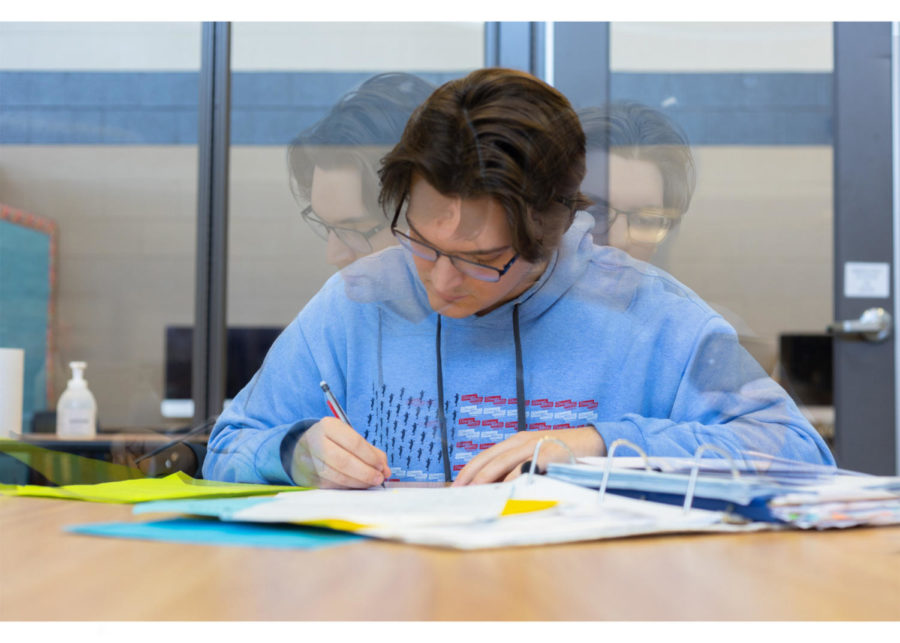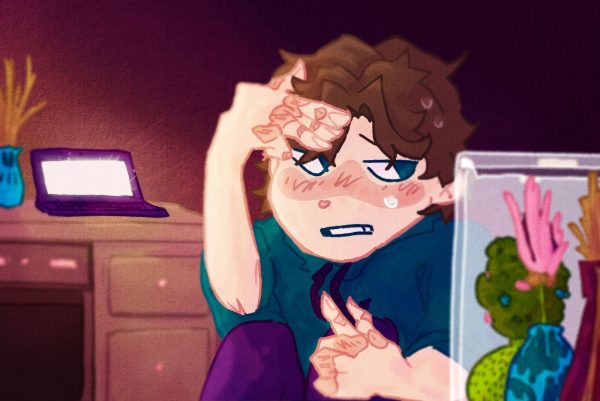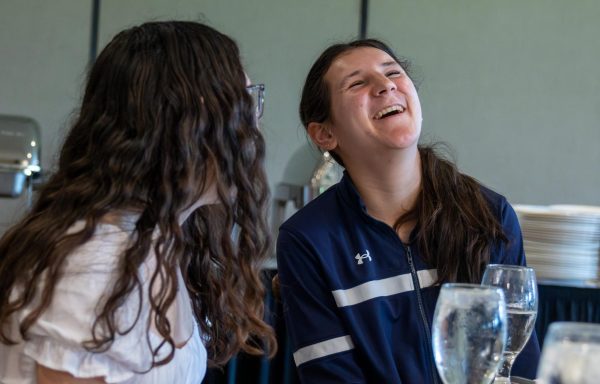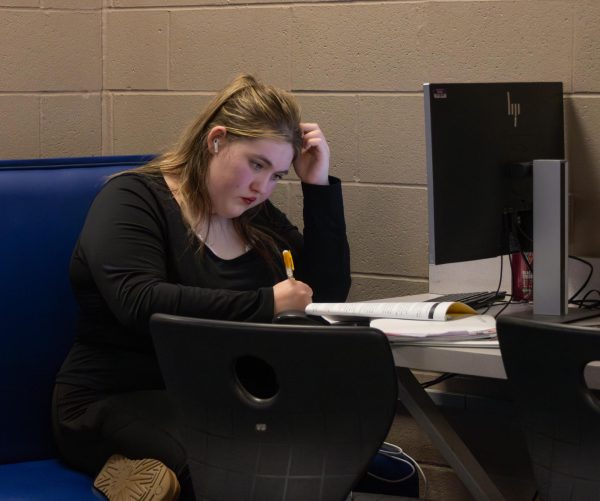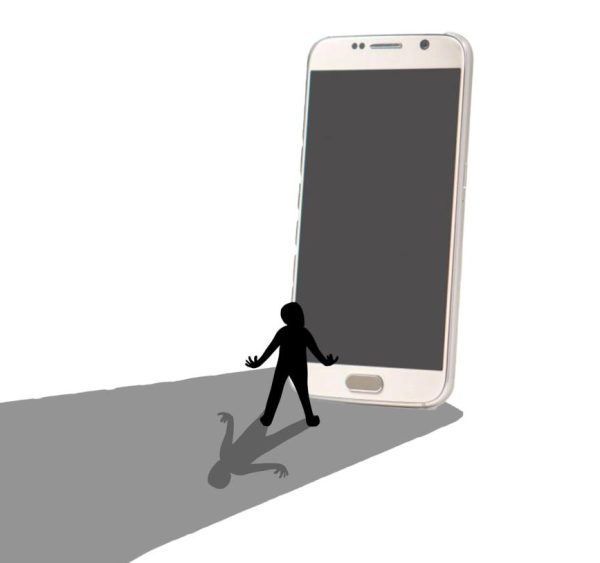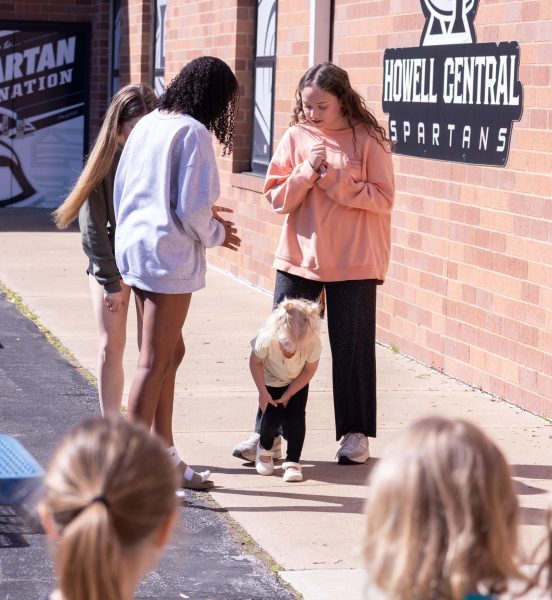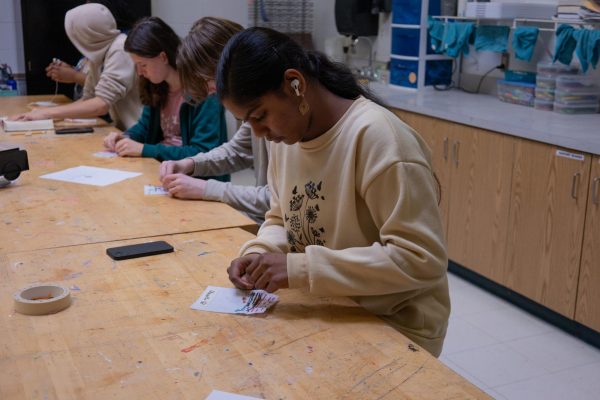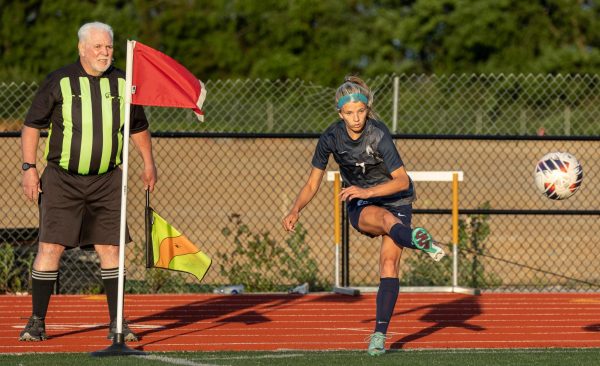Fighting to Focus
How ADHD affects the lives of those afflicted
FADING NOT FOCUSING: Senior Bobby Soderstrom is seated trying to concentrate on his homework as other versions of him attend to different tasks. While not always visible, the minds of many students with ADHD are often jumping from one thought to the next faster than they can keep up with.
After a long day at school, freshman Quinn Douglas joins her family at the table for dinner. She is overwhelmed by the sounds of her sister chewing, forks clattering, and her mom asking her how her day was. She can hardly focus on the plate in front of her. When the meal is done, she scurries to her room to take a breather.
Douglas’s experience is characteristic of someone with Attention Deficit Hyperactivity Disorder, or more commonly, ADHD, which is characterized by inattention, forgetfulness, impulsivity, fidgeting, and disorganization. ADHD is one of the most common learning disabilities in the U.S., with roughly 10 percent of U.S. children receiving an ADHD diagnosis according to the CDC.
Senior Bobby Soderstrom was diagnosed with ADHD in early elementary school and struggles with staying focused and on task.
“Your mind is going 1,000 miles per hour, but you’ve got to try and slow it down,” Soderstrom said.
For some, getting an ADHD diagnosis takes multiple appointments, specialists, and tests which can make it inaccessible for many. Douglas was diagnosed at 13, and she remembers how intense the process was.
“I had to go to an evaluation with a psychiatrist and we just talked first…then we had to schedule another day for the actual test which takes about two or three hours depending on how fast or slow you go,” Douglas said. “They test your auditory processing, they ask you a lot of questions about your family life…and then about two weeks later, you end up getting the results.”
Junior Hanna Lange was diagnosed with ADHD when she was in elementary school. She remembers what it was like to experience symptoms of ADHD at an early age.
“I started to drink cups of coffee every morning to calm me down. I would go to different rooms with no windows during storms, and I had to go in different rooms for tests,” Lange said. “Since I was young, I didn’t really understand, so it was easier, but now I struggle with it more since I’m getting older. It just gets harder and harder.”
Lange’s family does their best to support her, but she struggles with comparing herself to others in her family.
“They were more accepting and try to help me the best that they can. They do whatever they can to calm me down or to help me out,” Lange said. “I can’t do a lot of things that my sister can do and then it makes me feel stupid.”
ADHD affects all areas of life; Lange struggles with social anxiety because of her diagnosis.
“I have really bad social anxiety, so I won’t talk to a lot of people that I don’t know or I won’t talk whenever I’m in a class that I don’t know anybody,” Lange said.
Problems reading social cues is a common symptom of ADHD and one Douglas experiences.
“It makes it hard for me to read social cues with other people,” Douglas said. “I get told a lot I use a lot of sarcasm because that’s for me the safest way to communicate with people.”
For most high schoolers with ADHD, keeping up socially and academically is a chore. Douglas struggles with inattention; she may be physically present in class, but she doesn’t always feel mentally present.
“No matter how hard I try, I can’t focus in class,” Douglas said. “Some days I am not really all here, so I’m just kind of going through my day doing what I need to do, but I’m not actually enjoying anything or having fun.”
Soderstrom has similar struggles. Focusing in class and studying are especially difficult for him.
“It’s hard to study. Or sitting in [AP Calculus], it’s hard to keep that attention span going,” Soderstrom said.
Despite these difficulties, Lange feels like the staff at FHC are supportive of students with ADHD; they do a lot to assist students who are struggling.
“If [teachers] start to see me struggling, they know just to help me out or just pull me out and talk to me. Calm me down,” Lange said. Douglas feels supported by staff at school, but still has moments where understanding her teachers is difficult.
“I also have rejection-sensitive dysphoria, which is something that you can only have if you have ADHD, so a simple comment like ‘You could have done better on this test’ could send me into a really big downward spiral.”
Every person with ADHD has their own way of managing symptoms, for Douglas, this is medication.
“[The medication] affects my appetite a lot. It’s really hard for me to eat during the day. I’ve lost a lot of weight because of it, but it does help me focus a lot better in class and be less distracted,” Douglas said.
Soderstrom began taking medication for his ADHD when he was in elementary school.
“Through elementary school, I was on different doses to get the right balance,” Soderstrom said. “Freshman year I was like ‘I want to go off the medication…I don’t want to have that crutch in life.”
Freshman and sophomore year Soderstrom thrived without medication, but due to recent problems performing well in school, he has decided to start taking medication again. Lange used to take medication but now uses more creative solutions to manage her ADHD.
“My medication is to drink caffeine because it has the reverse effect on me, so it just calms me down more,” Lange said.
ADHD is a learning disability, but every individual with ADHD has different experiences connecting with the disabled community. Soderstrom does not feel connected at all with the disabled community, but Douglas and Lange have been able to connect a lot of their experiences to those of different disabilities.
“My sister also has a learning disability…we both have to learn differently and have to do things differently from other people because of the disability,” Douglas said.
Although ADHD is very common, public perception of the disorder can be inaccurate.
“I think a lot of [the misconception] has to do with what studies were done, and the fact that only white men were studied on, so a lot of people only see the hyperactive part which is physically showing like jumping around or being distracting in class,” Douglas said. “That really affects how people understand it and they don’t see the need to go and look it up what it actually is.”
Soderstrom believes that the misconceptions arise because of how new ADHD is as a diagnosis.
“It’s newer, when our parents were in school [ADHD] wasn’t really a thing…people are learning more about ADHD every day,” Soderstrom said.
Douglas hopes that people will continue to learn more about ADHD and be more accomodating in the future.
“There’s some days I wish I didn’t [have ADHD] because it affects every single thing,” Douglas said. “It affects my sleep. It affects my social life. It affects how I learn in school, it affects everything, but there’s also days where I’m really happy saying ‘Yeah, I have ADHD.’”
Your donation will support the student journalists of Francis Howell Central High School. Your contribution will allow us to purchase equipment and cover our annual website hosting costs. FHCToday.com and our subsequent publications are dedicated to the students by the students. We hope you consider donating to allow us to continue our mission of a connected and well-informed student body.




